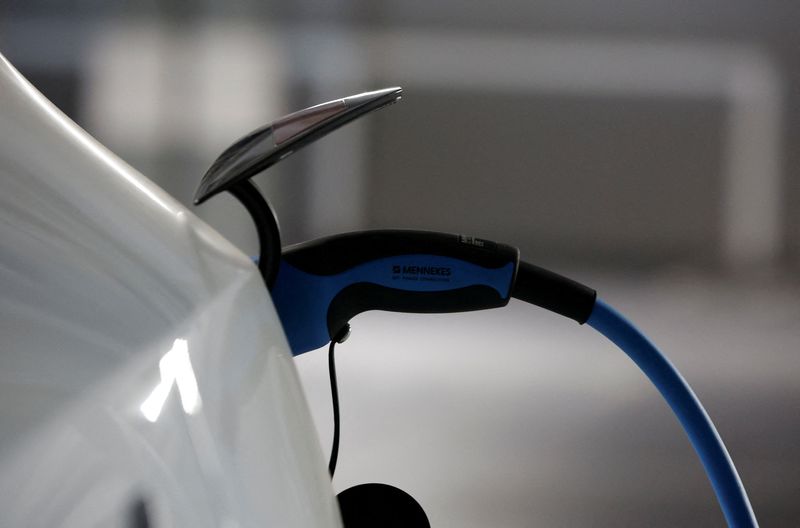By Julia Payne
BRUSSELS (Reuters) - Electric vehicle drivers hoping to top up their batteries at one of Repsol (OTC:REPYY)'s 1,600 Spanish charging stations might well be disappointed, with nearly half lying dormant because they have no power connection.
Such gaps are evident across the European Union, where last week the European Commission announced plans to upgrade the bloc's power grids. These are due to be implemented in 18 months and include addressing EV charging station power shortages.
But despite the declarations of its leaders, red tape preventing progress towards greener transport in the EU is on the rise, industry groups and energy companies told Reuters, with permitting one of the major roadblocks.
The ease of building an EV charging hub varies considerably country by country. One industry source said that in Germany a hub was held up for months over rules protecting a single tree, while another located on a busy highway had to wait 10 months for a noise evaluation before it gained approval.
"Although the work of installing a fast and ultra-fast charging point requires only two to three weeks of work, due to different administrative requirements in Spain, the complete process ... can last from one to two years," Repsol said.
Industry group ChargeUp Europe said that while the Commission recognised permitting was a problem, it had not proposed any concrete tools or actions. Specific guidelines for member states to accelerate permitting are only expected at some point over the next two years, the plan's timeline shows.
This is slowing down the rollout of charging hubs across the 27-member bloc, putting EU targets to phase out petrol and diesel vehicles, as well as its broader climate goals, in peril.
"The time needed for connecting the EV recharging points to the grid can indeed be seen as a barrier to accelerate the uptake of EVs and needs to be tackled," a Commission spokesperson said in an emailed response.
The process for setting up a fast EV station has risen to an average of two years from six months in the last few years, four EV charging companies and the industry's representative said, as firms wade through myriad rules from federal to municipal level.
"It's Kafka meets the energy transition. We have so many things working against Europe but we could fix this," Lucie Mattera, secretary general of ChargeUp Europe, told Reuters.
Mattera said the number of EVs will grow faster than the total number of public charging stations which ChargeUp Europe estimates will rise by nine times by 2030, with EVs by ten.
The electrification of transport is one of the key pillars underpinning the EU's goal of reaching carbon neutrality by 2050. To do so, it will ban sales of CO2-emitting vehicles from 2035 and wants to develop a network of EV charging stations.
That ambition has created bottlenecks for power companies and regulators unprepared for the surge in demand in the EU, where so far only 5.4% of passenger cars run on alternative fuels, including electric, out of a total 286 million.
"It's up to the member states now to really step up," Miguel Stilwell de Andrade, CEO of Portuguese energy firm EDP, said, adding: "There's just an avalanche of projects".
GRIDLOCK
This year, the EU adopted a law to install fast chargers by 2030 every 60 kilometres along designated road networks for passenger cars and every 100 km for heavy-duty vehicles.
But charging developers say obtaining basic data about potential hubs is a major challenge, making investments hard.
This involves finding out whether an average roadside rest stop has a single lamppost or enough cabling that connects to the broader grid. Hubs often require an extra electricity sub-station, which converts high voltage power into smaller units.
The process then involves requests to power distribution companies (DSOs) to install more capacity.
"Sometimes we have to send physical mail," said Peter Badik, co-founder of EV charging firm Greenway Network, which has set up 1,300 EV chargers in Slovakia, Croatia and Poland.
"Even when they say yes, you don't know when they will do the upgrade," Batik said, adding there was so far no way to track how quickly a power company was building up capacity.
Industry executives said the EU targets were set low and were therefore likely to be met, but might not meet demand for the growing EV fleet of cars and especially trucks.
There is a strong industry impetus to build hubs for electric cars, but not yet for long-haul trucks and buses. These account for more than 25% of greenhouse gas emissions from EU road transport, which as a whole is responsible for a fifth of the bloc's emissions.
BP (NYSE:BP), which expects to roll out more than 100,000 car and truck charging stations globally by 2030, said that in Germany alone, it has to deal with around 800 grid companies to set up fast hubs for both cars and trucks.
"Many have individual requirements which can significantly hinder progress," Stefan van Dobschuetz, vice president of BP Pulse Europe, said, adding that was before other types of permits concerning noise and archaeology are applied for.

"There is a clear need for more standardisation (of requirements for charging hubs)," BP's van Dobschuetz added.
That call was echoed by ChargeUp Europe's Mattera who said guidelines from the Commission would likely help EU members align as the rate of new projects varies across the region.